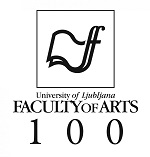|
The
summer school, which is to take place at the end of August 2019, is
part of the celebrations around the 100th anniversary of the founding
of the University of Ljubljana. The celebrations provide a very good
occasion for the University to present its achievements and its current
activities, and in this framework the Faculty of Arts will provide an
international platform for three prominent and internationally renowned
scholars who will fully engage themselves in presenting their new work.
Over five days, the school will offer two sessions per day, each
session consisting of a lecture with ample time for discussion. Each of
the lecturers will give three extensive lectures, with one common
session to conclude the program, thus ten sessions in all. The number
of participants is limited to 120.
The title is taken from Samuel Beckett famous line from Worstward Ho:
“Try again. Fail again. Fail better.” The title points to the stark
sense of the failure of critical thought and of emancipatory politics –
a sense of failure stemming from the rise of new populism, the
emergence of previously unthinkable leader figures, the looming social
and economic contradictions, the apocalyptic perspectives of global and
ecological catastrophes, etc. Such failure, however, is a starting
point that instigates new intellectual engagement.
The three lecturers have long been part of a group which has become
internationally known as “the Ljubljana School,” and the program will
start by revisiting some of the basic assets that have constituted the
presuppositions of the group, before bringing these assets into line
with the tumultuous present day.
- Given that psychoanalysis, especially the work of
Freud and Lacan, has been the background of this school of thought, the
present task is to address the crisis of psychoanalysis within the
decline of critical thought. What future is there for psychoanalysis?
- The legacy of German idealism, particularly of Hegel,
has formed the other major source of the group. This legacy requires a
constant re-examination, since insisting on its crucial critical
importance is largely at odds with both the postmodern ways of thinking
and with cognitivism and analytical philosophy.
- Becausee it has been largely overshadowed by cultural
issues and identity politics in leftist politics, the legacy of Marx
and Marxism demands a new engagement with the critique of political
economy.
- Is there a “sexual politics” implied by
psychoanalysis? Such a question requires a new elaboration in the times
of the “me-too” movement and the vast discussions and battles of LGBT+.
- Psychoanalysis was largely inscribed into the
framework of the rise and decline of modernism. What are its relations
with modernist art and its political implications? Has the insistence
on some basic modernist assets become conservative?
- The pressing task at hand is the reflection on the
current rise of populism, the alt-right and the new type of political
authority, all of which can be seen against the backdrop of the failure
of emancipatory politics.
These broad questions and themes will provide the general framework of
the summer school where Mladen Dolar, Slavoj Žižek and Alenka Zupančič
will present their latest as well as new work and will try to come up
with some proposals as to how to “fail better.”
|
|
|

 Student protests in 1971, Slovene equivalent of May 68.
Student protests in 1971, Slovene equivalent of May 68.
 Student protests in 1971, Slovene equivalent of May 68.
Student protests in 1971, Slovene equivalent of May 68.